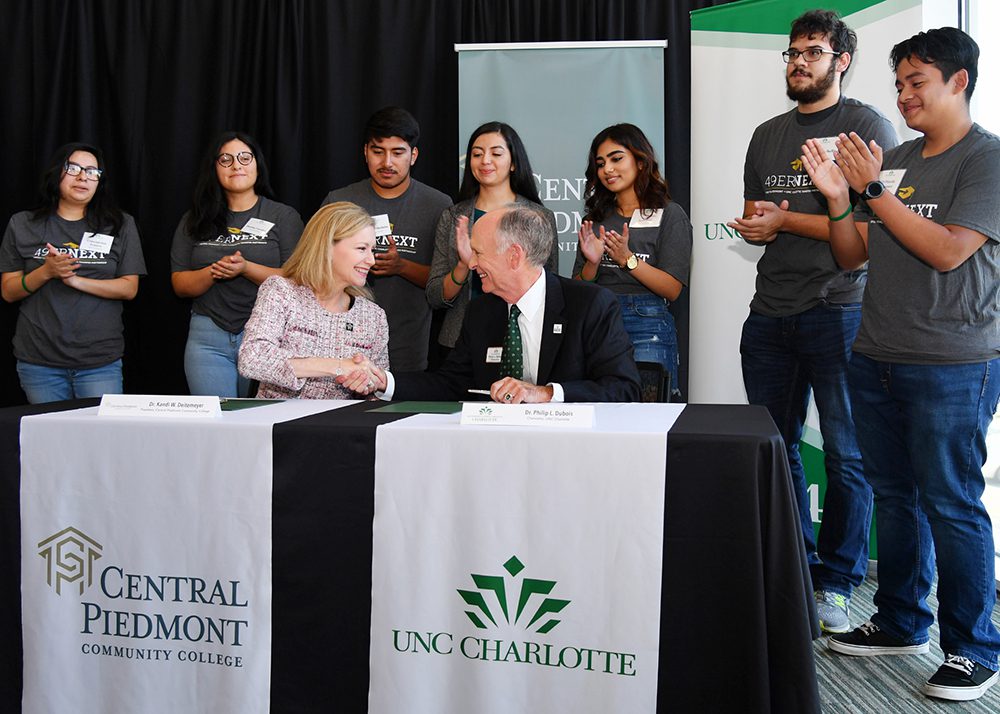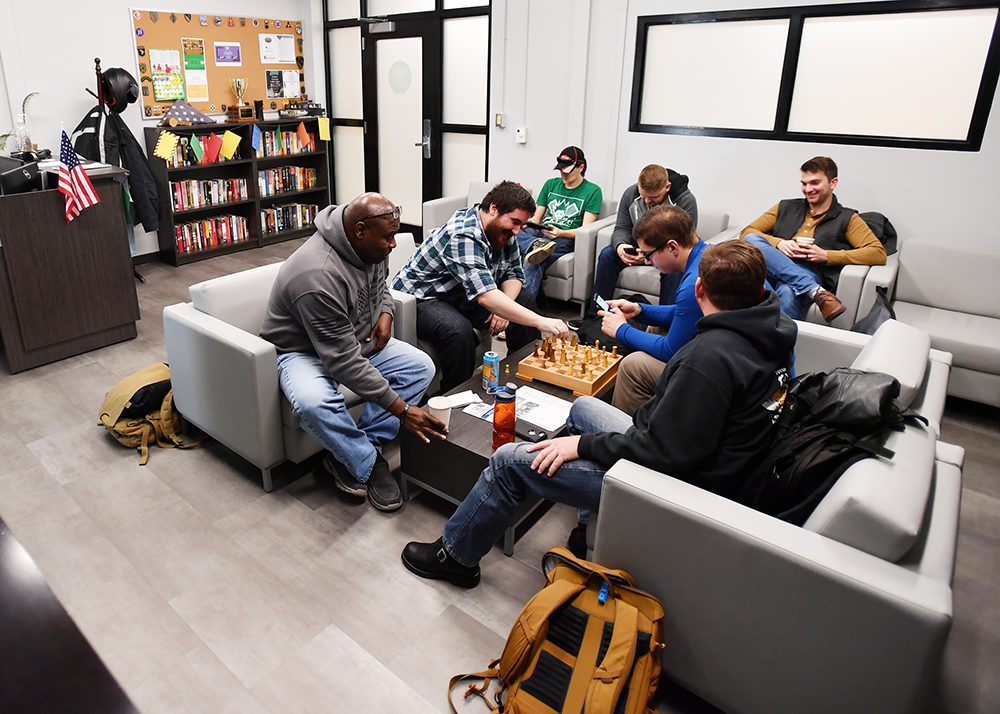Easing the Transition

A lasting legacy. This story is part of a series demonstrating the achievement, impact and growth of UNC Charlotte under the leadership of Chancellor Philip L. Dubois.
UNC Charlotte was built on its nontraditional study body. Founded as an institution to educate returning WWII veterans, the University has remained committed through its 74-year history to educating those who seek to start—or complete—their education later in life.
From day one, Chancellor Philip L. Dubois has shown dedication to these students through programs he has supported to help the University’s adult, veteran and other nontraditional students transition smoothly to college life. His support of them is a hallmark of his tenure at UNC Charlotte.
Students’ success is a reflection of their academic preparation, and Dubois often has touted the value proposition of higher education, which is why UNC Charlotte’s “work with the schools and our colleagues in the community colleges takes on another level of importance for us. At whatever stage they come to the University, students are better off long term with a college degree.”
Crossing the Finish Line
Life can get in the way of getting an education, but it doesn’t have to be a permanent roadblock. That’s the goal of UNC Charlotte’s award-winning 49er Finish program — to provide a clear pathway for students who for a variety of reasons left the University before completing their degrees.
The program was implemented in fall 2005 to help former undergraduate students complete their degrees. Staff in the Office of Adult Students and Evening Services recruit and help re-enroll students, offering them personalized academic advising and professional development.
To date, 49er Finish has made it possible for more than 1,000 students to cross the finish line to graduation, including Jon Venable, the 1,000th former student to return through the 49er Finish program (pictured above).
The program has been recognized nationally, having won the outstanding advising program award from the National Academic Advising Association and the Malcolm Knowles Award for Outstanding Adult Education Program.
“You shouldn’t let the dream go because life happens,” said Victoria Namishia, who earned a degree in 2012 thanks to the 49er Finish program. “Langston Hughes, in his poem ‘Harlem,’ asks ‘What happens to a dream deferred?’ I can answer that question—it doesn’t go away. It hides and it waits for the opportunity to be realized.”

The Next Step
UNC Charlotte admits a large number of transfer students every year, and the transfer to UNC Charlotte got easier for many of them last fall through the implementation of 49erNext.
In October 2019, Dubois and Kandi Deitemeyer, president of Central Piedmont Community College, announced 49erNext, a co-admission program that creates a smooth path for students who start their studies at CPCC and wish to complete their degree at UNC Charlotte (pictured above). 49erNext students can transfer into 75-plus undergraduate degree programs, representing more than 130 majors, if they earn an associate degree at CPCC with at least a 2.0 GPA.
The program also entitles students to career planning and financial aid support services as well as privileges such as the use of UNC Charlotte’s library and free admission to 49ers athletics and other events. There were 111 students enrolled in 49erNext during the fall 2019 semester.
The University hopes to expand the program to other community colleges in the state.
“UNC Charlotte admits the most transfer students of all universities in the UNC System, so this partnership with Central Piedmont will ensure that we are meeting students’ academic, financial aid, and career planning needs while making the transfer experience more seamless,” Dubois said when announcing the program. “Nearly 60 percent of students in the inaugural 49erNext class are from underrepresented populations, and this program is designed to produce a greater number of workforce-ready, qualified graduates at a significant cost savings to them.”

Invested in Veterans
UNC Charlotte, founded as the Charlotte Center in 1946, was established to educate WWII veterans. The University has remained committed to that mission.
In fall 2009, UNC Charlotte began offering tuition support for veterans who qualified for the Post 9/11 Yellow Ribbon Program, which gives veterans the chance to continue their studies. In spring 2010, 26 undergraduate and eight graduate students enrolled in UNC Charlotte with the assistance of Yellow Ribbon Program funds and tuition assistance from University funds.
Today, the University enrolls more than 900 veteran and military-affiliated students—and it has expanded services to support them.
In fall 2015, the Graduate School began offering two-year assistantships for veterans that cover tuition and health insurance and include a stipend. The assistantships are available to veterans who have received an honorable discharge and are enrolled in a master’s or doctoral program at the University.
The University’s Veterans Services Office has a staff of four dedicated to meeting the needs of this growing population of students. And in November 2018, UNC Charlotte debuted the Cpl. Robert Qutub USMC Veterans Lounge, a safe space for veterans to gather for studying, relaxation and to participate in group discussions (pictured above). The lounge, located inside Barnard Hall, includes upgraded office equipment and other supplies to help veteran students work more effectively. In November 2019, the University opened its Veterans Park, which honors past and present members of the UNC Charlotte community who have served in the military.